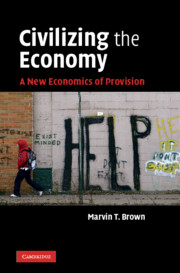Book contents
- Frontmatter
- Contents
- List of figures
- List of tables
- Preface
- 1 Introduction: creating a just and sustainable economy
- Part I Creating a new economic framework
- Part II The civic option
- Part III A civic view of labor, land, and money
- 9 Labor: employment as engagement
- 10 Land: ownership as a concession
- 11 Money: commodity or credit
- Part IV Civilizing economic systems
- Part V A civic agenda
- Appendix: Free enterprise and the economics of slavery
- Bibliography
- Index
10 - Land: ownership as a concession
Published online by Cambridge University Press: 05 June 2012
- Frontmatter
- Contents
- List of figures
- List of tables
- Preface
- 1 Introduction: creating a just and sustainable economy
- Part I Creating a new economic framework
- Part II The civic option
- Part III A civic view of labor, land, and money
- 9 Labor: employment as engagement
- 10 Land: ownership as a concession
- 11 Money: commodity or credit
- Part IV Civilizing economic systems
- Part V A civic agenda
- Appendix: Free enterprise and the economics of slavery
- Bibliography
- Index
Summary
When we discussed the meaning of property in Chapter 5, we said that the idea of property implied ownership and ownership required a legal title. This means that a piece of land is not actually property until someone has a legal title to it, which is a political act. Without the political acts that establish land as property, the ownership of land is subject to the will of the stronger.
The status of the land, of course, is always subject to how we define it. Even if we define it as “natural,” we usually remain within our understanding of it. To see the land as something beyond understanding, as something else, is difficult. Every once in a while – at the ocean, in the forests, at twilight, or in memories of changing seasons – we recognize “nature” as something not subject to our definition, but as something else. This is something you cannot own, buy and sell. It is something our definitions never totally encompass. It is the aspect of nature that makes it a living system.
The danger we face today is that by determining land as property (a determination does terminate what it defines), we may well kill the breathing of the earth. Perhaps no one has captured this threat more clearly than Aldo Leopold. In his A Sand County Almanac (1949), he described the land as a living system:
Land, then, is not merely soil; it is a fountain of energy flowing through a circuit of soils, plants, and animals. […]
- Type
- Chapter
- Information
- Civilizing the EconomyA New Economics of Provision, pp. 121 - 129Publisher: Cambridge University PressPrint publication year: 2010



